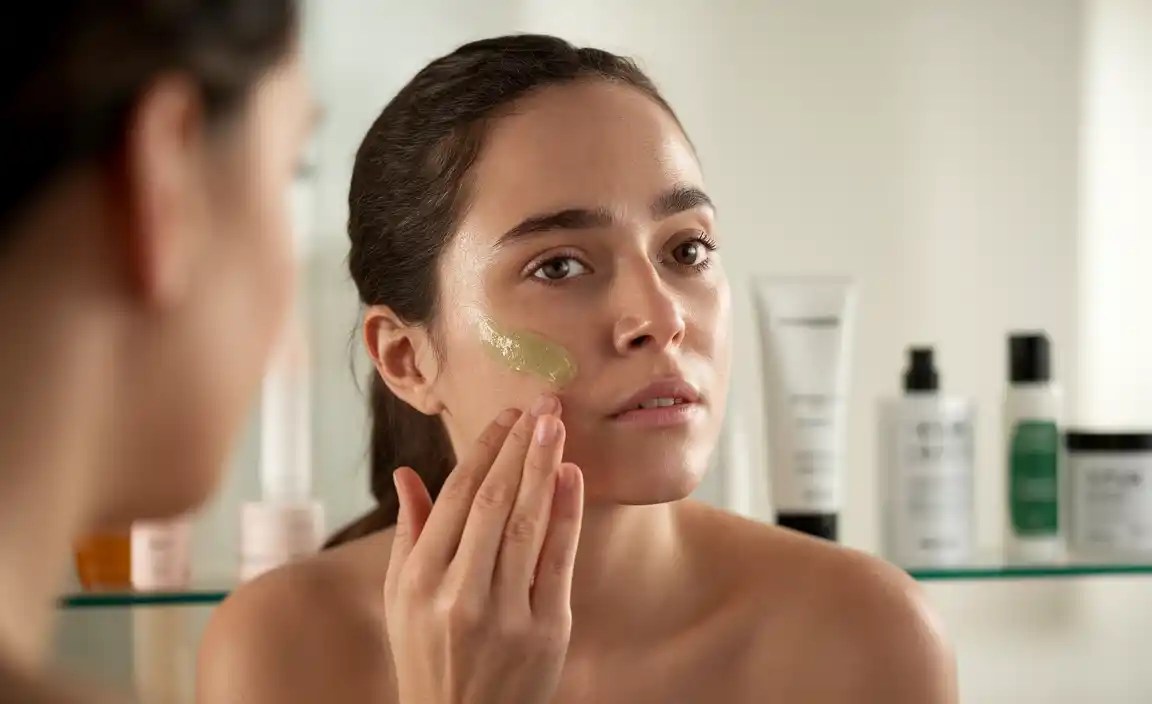Do you ever wonder why your skin feels so oily? It can be frustrating, right? You might feel like you’ve tried everything without seeing good results. If you have organic oily skin, there are certain steps you can follow to help it glow!
Imagine waking up to skin that feels fresh and clean. It seems hard to believe, but a simple routine can change everything. Studies show that many people struggle with oily skin, but few know the right tips to care for it.
This article shares easy organic oily skin routine tips. You’ll discover how to use natural products that work wonders. Get ready to say goodbye to confusion and hello to healthy skin! With just a few changes, your skin can feel balanced and beautiful. Excited yet? Let’s dive in!

Essential Organic Oily Skin Routine Tips For Healthy Skin
Creating a skincare routine for oily skin can be challenging. Did you know that using organic products can really help? Start with a gentle cleanser made from natural ingredients like tea tree oil.

This helps control oil without stripping your skin. Follow up with a light, organic moisturizer to keep your skin hydrated. Exfoliating regularly with homemade scrubs can clear out pores, too. Lastly, remember to use sunscreen; even oily skin needs protection!
Understanding Oily Skin
Definition and characteristics of oily skin. Common causes of excess oil production.
Oily skin is like a pizza with extra cheese! It’s shiny and may have a few bumps. This happens because your skin makes too much oil. Some reasons include hormones, genetics, and sometimes just being a teenager. Stress can also turn up the oil production dial. Want to know a secret? The most common cause is hormones! They can make your skin feel like a slip-and-slide. Let’s take a look at factors contributing to this oily dilemma:
| Cause | Description |
|---|---|
| Hormones | These little troublemakers can boost oil production. |
| Genetics | If mom or dad had oily skin, you might too! |
| Diet | Greasy foods can get your skin feeling greasy. |
| Stress | Feeling stressed? Your skin might act up! |
Knowing what causes oily skin can help you tackle it better. So, say goodbye to that shiny pancake face with some good tips!
The Importance of Organic Products for Oily Skin
Benefits of using organic ingredients. Differences between organic and nonorganic skincare.
Choosing organic products for oily skin is like picking the toppings for your pizza—gotta get it right! Organic ingredients can work wonders because they’re natural and gentle. They help avoid harsh chemicals that can make your skin rebel and go all oily, like a teen during summer break. Organic goodies like tea tree oil tackle those pesky pimples, while shea butter moisturizes without feeling greasy.
| Feature | Organic Products | Non-Organic Products |
|---|---|---|
| Ingredients | Natural and pure | Often synthetic and harsh |
| Skin Reaction | Gentle, less irritation | May cause breakouts |
| Environmental Impact | Eco-friendly | Can harm ecosystems |
Switching to organic can feel like painting the Mona Lisa instead of doodling on your notebook. Give your skin the gift of organic! It deserves the best, just like your favorite video game hero!
Daily Skincare Routine for Oily Skin
Morning routine: cleansing, toning, and moisturizing. Evening routine: cleansing and treatment options.
Start your day with a simple routine for oily skin. First, gently cleanse your face to remove dirt and oil. Next, use a toner to help shrink pores and balance your skin. Finish with a lightweight moisturizer to keep your skin hydrated without adding grease.
In the evening, repeat the cleansing step to wash away the day’s grime. You might want to use a spot treatment for any blemishes, which will help your skin heal. Keeping a consistent routine helps your skin stay fresh and healthy.
What should I include in my morning skincare routine for oily skin?
Your morning routine should include:
- Cleansing – Use a gentle face wash.
- Toning – Apply a toner to balance your skin.
- Moisturizing – Choose a light moisturizer.
What should I do in my evening skincare routine for oily skin?
Your evening routine should consist of:
- Cleansing – Remove dirt and makeup.
- Treatment options – Use spot treatments for blemishes.
Key Organic Ingredients for Oily Skin
Best organic cleansers for oily skin. Effective organic moisturizers and their role.
Choosing the right organic products is key for oily skin. Best organic cleansers help remove dirt without stripping moisture. Look for ingredients like:
- Tea Tree Oil: A natural antibacterial.
- Aloe Vera: Soothes and hydrates.
- Witch Hazel: Controls excess oil.
Effective organic moisturizers can balance skin. They keep your skin soft while reducing shine. Ingredients to try include:
- Jojoba Oil: Mimics skin oil, great for hydration.
- Shea Butter: Provides moisture without greasiness.
- Chamomile: Calms irritated skin.
DIY Organic Remedies for Oily Skin
Simple recipes for homemade face masks. Natural toners and scrubs using household ingredients.
Making your own face masks and toners is fun and easy! You can use things you have at home. Here are some ideas:
- Honey and Oatmeal Mask: Mix 2 tablespoons of honey with 1 tablespoon of oatmeal. Spread it on your face, leave it for 15 minutes, then wash off.
- Yogurt Toner: Apply plain yogurt on your skin. It helps reduce oil and keeps skin smooth.
- Cucumber Scrub: Blend 1 cucumber and mix it with a tablespoon of sugar. Scrub gently to remove dirt.
These easy recipes can help improve oily skin quickly!
What are some DIY remedies for oily skin?
You can try masks like banana and honey for hydration. Don’t forget to use lemon juice as a natural toner. This helps reduce oil and brighten your skin. DIY remedies are simple and fun!
Common Mistakes in Oily Skin Care
Misconceptions about moisturizing oily skin. Overcleansing and its effects.
Many people think that if their skin is oily, they don’t need to moisturize. This is a common myth! Even oily skin requires hydration. Skipping moisturizer can make your skin produce even more oil to compensate. Overcleansing is another big mistake. Washing your face too much can strip away natural oils, leading to dryness and irritation. So, be gentle and stick to a simple routine. Your skin will thank you!
| Common Mistake | Effect |
|---|---|
| Not moisturizing | Can increase oil production. |
| Overcleansing | Causes dryness and irritation. |
Additional Tips for Managing Oily Skin
Lifestyle changes that impact oil production. Importance of diet and hydration.
Making a few lifestyle changes can help control oily skin. Stress can increase oil levels, so try relaxation techniques like deep breathing. Sleep is also vital; aim for 7-9 hours each night. Food choices matter too. Eating fruits, veggies, and whole grains can help your skin. Drink plenty of water to keep your skin hydrated.
- Limit sugary and greasy foods.
- Exercise regularly for better blood flow.
- Try to sleep well for skin repair.
How does diet affect oily skin?
Eating healthy foods can reduce oil. Needing less sugar and grease helps to balance oil levels. Hydration is essential too. Drink enough water every day for healthy-looking skin.
When to Seek Professional Help
Signs that require dermatologist intervention. Recommended treatments and procedures for oily skin.
Sometimes, your skin needs a little extra love. If you notice persistent breakouts, large pores, or oily patches that won’t go away, it might be time to call in a professional. Your friendly neighborhood dermatologist can help with treatments like chemical peels or prescription creams. Remember, even superheroes need sidekicks! It’s also wise to seek help if you face redness or swelling—it could mean your skin is throwing a tantrum.
| Signs for Dermatologist | Recommended Treatments |
|---|---|
| Persistent Acne | Chemical Peels |
| Large Pores | Prescription Creams |
| Redness or Swelling | Topical Treatments |
Don’t wait until your skin plans a full-blown protest. Getting help early can keep your glow intact!
Conclusion
In summary, an effective routine for organic oily skin includes gentle cleansers, light moisturizers, and natural ingredients. You should avoid harsh products that strip moisture. Remember to always sunscreen daily. Regular exfoliation helps keep pores clear. If you want more tips, explore trusted skincare blogs or consult a dermatologist. Start your journey to healthier skin today!
FAQs
Sure! Here Are Five Related Questions On The Topic Of Organic Oily Skin Routine Tips:
Sure! Here are some tips for taking care of oily skin. First, wash your face twice a day with a gentle soap. This helps remove extra oil. Next, use a light moisturizer to keep your skin happy. Lastly, try not to touch your face too much to avoid more oil.
Sure! Please provide me with the question you’d like me to answer.
What Are The Best Organic Cleansers For Oily Skin To Help Control Excess Oil Without Stripping Moisture?
Some of the best organic cleansers for oily skin include tea tree oil, aloe vera, and chamomile washes. These ingredients help to control oil without drying your skin. You can also look for cleansers with witch hazel and jojoba oil. They are gentle and keep your skin clean and healthy. Remember to check the labels to ensure they are organic!
How Can I Effectively Use Natural Exfoliants To Prevent Clogged Pores And Acne On Oily Skin?
To use natural exfoliants, you can try things like sugar or baking soda. Mix them with water to make a paste. Gently rub this paste on your face for a minute. Then, wash it off with warm water. Doing this once or twice a week helps keep your skin clean and clear!
Which Organic Moisturizers Are Suitable For Oily Skin That Won’T Cause Breakouts Or Increase Oiliness?
If you have oily skin, try using lightweight moisturizers. Look for ingredients like aloe vera or jojoba oil. These help your skin stay hydrated without making it greasy. Avoid heavy creams or oils, as they can cause breakouts. Always test a small bit first to see how your skin reacts!
What Natural Ingredients Should I Look For In Toners And Masks That Can Help Balance Oily Skin?
You can look for witch hazel in toners and masks. It helps calm and cool your skin. Aloe vera is also great. It soothes and hydrates without making your skin oily. Tea tree oil can help fight germs and keep your skin clear. Finally, lemon juice can help balance oil and brighten your skin!
How Can I Incorporate Organic Dietary Changes To Support Healthier Skin From The Inside Out In My Oily Skin Routine?
To help your skin feel better, you can eat more fruits and veggies. Try to choose organic foods when you can. Drink lots of water to stay hydrated. Avoid sugary snacks and drinks, as they can make your skin oily. You can also eat foods with healthy fats, like nuts and fish, to support your skin.
